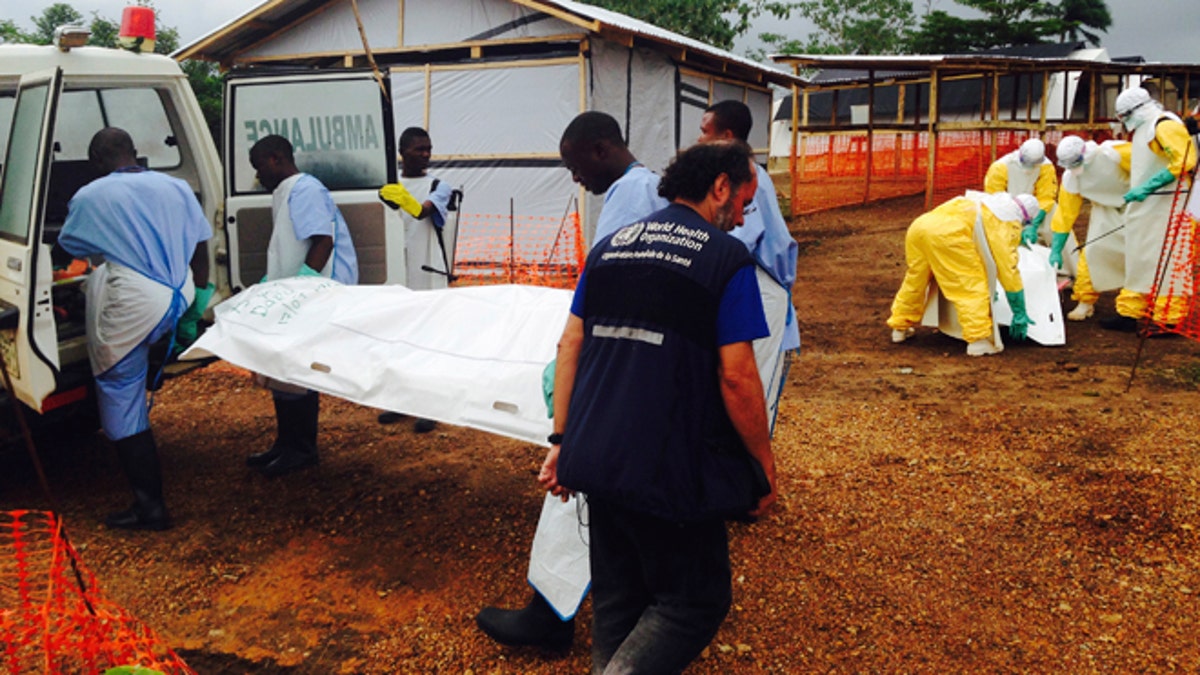
Volunteers carry bodies in a centre run by Medecins Sans Frontieres for Ebola patients in Kailahun August 2, 2014. Hundreds of troops were deployed in Sierra Leone and Liberia on Monday to quarantine communities hit by the deadly Ebola virus, as the death toll from the worst-ever outbreak reached 887 and three new cases were reported in Nigeria. Picture taken August 2, 2014. REUTERS/WHO/Tarik Jasarevic/Handout via Reuters
Relatives of Ebola victims in Liberia defied government quarantine orders and dumped infected bodies in the streets as West African governments struggled to enforce tough measures to curb an outbreak of the virus that has killed 887 people.
In Nigeria, which recorded its first death from Ebola in late July, authorities in Lagos said eight people who came in contact with the deceased U.S. citizen Patrick Sawyer were showing signs of the deadly disease.
The outbreak was detected in March in the remote forest regions of Guinea, where the death toll is rising. In neighboring Sierra Leone and Liberia, where the outbreak is now spreading fastest, authorities deployed troops to quarantine the border areas where 70 percent of cases have been detected.
Those three countries announced a raft of tough measures last week to contain the disease, shutting schools and imposing quarantines on victim's homes, amid fears the incurable virus would overrun healthcare systems in one of the world's poorest regions.
In Liberia's ramshackle ocean-front capital Monrovia, still scarred by a 1989-2003 civil war, relatives of Ebola victims were dragging bodies onto the dirt streets rather than face quarantine, officials said.
Information Minister Lewis Brown said some people may be alarmed by regulations imposing the decontamination of victims' homes and the tracking of their friends and relatives. With less than half of those infected surviving the disease, many Africans regard Ebola isolation wards as death traps.
"They are therefore removing the bodies from their homes and are putting them out in the street. They're exposing themselves to the risk of being contaminated," Brown told Reuters. "We're asking people to please leave the bodies in their homes and we'll pick them up."
Brown said authorities had begun cremating bodies on Sunday, after local communities opposed burials in their neighborhoods, and had carried out 12 cremations on Monday. Meanwhile, in the border region of Lofa County, troops were deployed on Monday night to start isolating effected communities there.
"We hope it will not require excessive force, but we have to do whatever we can to restrict the movement of people out of affected areas," Brown said.
Finance minister Amara Konneh said the country's growth forecast for the year was no longer looking realistic as a result of the outbreak.
British Airways said it was suspending flights to and from Liberia and Sierra Leone until the end of the month due to public health concerns.
MISSIONARY DUE BACK IN UNITED STATES
A second American aid worker who contracted the Ebola virus in West Africa arrived in the United States on Tuesday in a serious condition, three days after her colleague was flown for treatment at the Emory University Hospital in Atlanta.
The two saw their conditions improve by varying degrees in Liberia after they received an experimental drug developed by San Diego-based private biotech firm Mapp Biopharmaceutical Inc, said a representative for Samaritan's Purse, the charity they worked for.
A New York hospital is also testing a man with symptoms of the deadly disease, though a senior medical officer there said it was probably not the deadly virus. Saudi Arabia was also testing a man for suspected Ebola infection after he returned recently from a business trip to Sierra Leone.
Concern grew over an outbreak in Lagos, Africa's largest city, after medical authorities there said they had quarantined 14 people who came into contact with Sawyer after he arrived on a regional flight from Liberia. The airline Asky has since been barred from Nigeria.
"Of the 14 who have had serious contact with the victim, eight have serious symptoms," Lagos Health Commissioner Jide Idris told a news conference. "Only one of those quarantined has tested positive ... The doctor who tested positive is now on the mainland under intensive care."
With healthcare systems in the West African nations overrun by the epidemic, the African Development Bank and World Bank said they would immediately disburse $260 million to the three countries worst affected - Sierra Leone, Liberia and Guinea.
In Monrovia, however, some health clinics were deserted as workers and patients stayed home, afraid of catching the disease.
"The health workers think that they are not protected, they don't have the requisite material to use to protect themselves against the Ebola disease," said Amos Richards, a physician's assistant.
